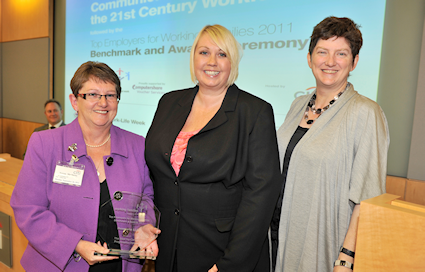Top Employers for Working Families – Benchmarking Report 2012
This detailed Benchmark Report (2012) demonstrates how leading employers make flexibility work for the bottom line and enable employees to honour their family commitments.
 The winners of the Top Employers for Working Families Awards 2011 were announced in September at a ceremony hosted by Citi. The Benchmark and Awards, founded by Working Families in partnership with the Institute for Employment Studies, recognise organisations across the UK that do the most to support the work-life balance needs of all their employees.
The winners of the Top Employers for Working Families Awards 2011 were announced in September at a ceremony hosted by Citi. The Benchmark and Awards, founded by Working Families in partnership with the Institute for Employment Studies, recognise organisations across the UK that do the most to support the work-life balance needs of all their employees.
Ninety organisations, representing around one million employees, completed a detailed and challenging benchmark survey that examined their flexible working policies and practices. A good mix of private and public sector and large and small employers submitted information. The survey is deliberately designed to paint a picture of the platinum standard in flexible working, and organisations who came close to that are doing very well indeed.
The results clearly demonstrated that employers are showing a growing acceptance that flexible working and work-life integration are vital to an organisation’s effectiveness and business success. Approaches such as advertising all posts as available for flexible working, recognising the particular role of fathers (including support groups for separated fathers and generous fully paid paternity leave), and ensuring flexible workers have access to development and career progression, were just some of the key steps taken by those who won awards IES originally designed the survey with Working Families and every year we support the evaluation, the judging and the recommendations to all organisations who want to better at supporting their flexible workers and achieving a flexible workforce. This year’s recommendations suggested that, for the future, organisations focus on:

Mary Mercer, IES Principal Consultant, middle, presented this award to Henmans, as they are actively encouraging the promotion of staff who work flexibly and ensuring these staff get fair performance management reviews, which is something IES has been urging employers to do. this year (who included Centrica, Deutsche Bank and the Chelsea and Westminster Hospital NHS Trust).
This detailed Benchmark Report (2012) demonstrates how leading employers make flexibility work for the bottom line and enable employees to honour their family commitments.